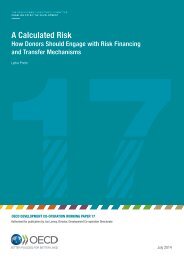UNIVERSITY
Livelihood_resilience_working_paper22
Livelihood_resilience_working_paper22
You also want an ePaper? Increase the reach of your titles
YUMPU automatically turns print PDFs into web optimized ePapers that Google loves.
to successfully educate their children, build up their productive assets, and get out of poverty. <br />
Extreme poverty is itself a poverty trap, since poor persons lack the means to participate <br />
meaningfully in society. In economics, the term poverty trap is often used at national scales, <br />
referring to a self-‐perpetuating condition where an economy, caught in a vicious cycle, suffers from <br />
persistent underdevelopment (Matsuyama 2008). Many proposed models of poverty traps are found <br />
in the literature” (Glossary, IPCC WG2 AR5 2014). <br />
Resilience: “The capacity of social, economic, and environmental systems to cope with a hazardous <br />
event or trend or disturbance, responding or reorganizing in ways that maintain their essential <br />
function, identity, and structure, while also maintaining the capacity for adaptation, learning, and <br />
transformation (Arctic Council 2013)” (Glossary, IPCC WG2 AR5 2014). <br />
Risk xxxii : “The potential for consequences where something of human value (including humans <br />
themselves) is at stake and where the outcome is uncertain. Risk is often represented as probability <br />
of occurrence of hazardous events or trends multiplied by the consequences if these events occur” <br />
(Glossary, IPCC WG2 AR5 2014). <br />
Social protection: “In the context of development aid and climate policy, social protection usually <br />
describes public and private initiatives that provide income or consumption transfers to the poor, <br />
protect the vulnerable against livelihood risks, and enhance the social status and rights of the <br />
marginalized, with the overall objective of reducing the economic and social vulnerability of poor, <br />
vulnerable, and marginalized groups (Devereux & Sabates-‐Wheeler 2004). In other contexts, social <br />
protection may be used synonymously with social policy and can be described as all public and <br />
private initiatives that provide access to services, such as health, education, or housing, or income <br />
and consumption transfers to people. Social protection policies protect the poor and vulnerable <br />
against livelihood risks and enhance the social status and rights of the marginalized, as well as <br />
prevent vulnerable people from falling into poverty” (Glossary, IPCC WG2 AR5 2014). <br />
Sustainable development: “Development that meets the needs of the present without <br />
compromising the ability of future generations to meet their own needs (WCED 1987)” (Glossary, <br />
IPCC WG2 AR5 2014). <br />
Tipping point xxxiii : “A level of change in system properties beyond which a system reorganizes, often <br />
abruptly, and does not return to the initial state even if the drivers of the change are abated” <br />
(Glossary, IPCC WG2 AR5 2014). <br />
Traditional knowledge: “The knowledge, innovations, and practices of both indigenous and local <br />
communities around the world that are deeply grounded in history and experience. Traditional <br />
knowledge: is dynamic and adapts to cultural and environmental change, and also incorporates <br />
other forms of knowledge and viewpoints. Traditional knowledge is generally transmitted orally <br />
from generation to generation. It is often used as a synonym for indigenous knowledge, local <br />
knowledge, or traditional ecological knowledge” (Glossary, IPCC WG2 AR5 2014). <br />
Transformation: “A change in the fundamental attributes of a system, often based on altered <br />
paradigms, goals, or values. Transformations can occur in technological or biological systems, <br />
financial structures, and regulatory, legislative, or administrative regimes” (Glossary, IPCC WG2 AR5 <br />
xxxii<br />
This definition builds from the definitions used in Rosa (1998) and Rosa (2003). <br />
xxxiii<br />
The WGI AR5 defines tipping point in the context of climate: “In climate, a hypothesized critical threshold when global or regional <br />
climate changes from one stable state to another stable state. The tipping point event may be irreversible.”



